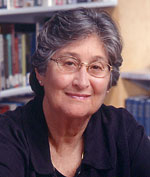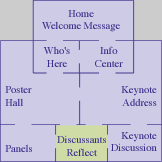 Ann Lieberman Ann Lieberman |
I was struck by some interesting themes that seemed to cut across many of the posters - both the things that hindered the projects and those that supported their success.
On the hindrance side there was almost unanimity on the fact that teacher turnover was a problem. Projects would gear up, have summer workshops and then find that there were a host of new teachers who had no idea what was going on. In the current climate, it seems that all projects must be self conscious about this and PLAN for it to happen. The question: "How shall we bring newcomers into the project?" needs to be in the project plans. The same thing is true of administrative turnover, but that is a bit more complicated. Several projects were moving right along when they got a new Superintendent or a new Science Coordinator. In these cases, much political work needs to be done to get the new administration on board - not easy, but not impossible.
|
Several projects seemed to have trouble with the district shifting focus which then sets up competing goals for the schools (and for the teachers), to speak nothing of the project directors. In some cases, projects continued their work in a less intense way, and sometimes accomplished less because of this. I know several of these districts and know that districts have a bad habit of fragmenting a school as it tries to cope with teachers learning new curriculum content and pedagogy. In these projects the goals were lofty in that they were trying to get teachers to shift their understanding, their pedagogy and the content in science or math. You can't do it without giving it the time, focus, and support over time. The projects who attained many of their goals proved this to be so.
What was very exciting was the amount of success and the many things learned and implemented in these projects. Most impressive for me was the almost unanimous development of some type of teacher leadership in these projects. In effect, the projects were replacing the usual expert/novice relationship in professional development with the peer/peer relationship. This is very significant because it means that at least in these projects, people understood that sustainability has EVERYTHING to do with developing a cadre of teachers who know their content and pedagogy and are learning how to lead in a way that engages fellow teachers in the context of real work. It has implications for our understanding a new view of development as well as leadership. Almost everyone had plans to develop master teachers, lead teachers, support teachers, mentors and staff development teams. Learning how to connect content and pedagogy, foster a collaborative spirit, and provide scaffolding learning for teachers has been a long time in coming. These projects give us numerous ways to think about these strategies.
The projects that appeared to be able to sustain themselves not only had some kind of teacher leadership at their core, but also some structures for ongoing follow up. One person said that professional development needs to be an ongoing part of our plans. This realization that it is not a workshop, or a set of one-shot hits is also significant as it gives us a way of thinking and organizing for the continuous inquiry into practice that some researchers are finding to be powerful.
|


